"Ex-banker ordered to return to Russia"
Ex-banker ordered to return to Russia
Justice Department panel reverses '99 ruling that granted political asylum
Sun StaffIn February 1999, after a tangled legal battle that featured testimony from FBI, CIA and KGB officers, a U.S. immigration judge granted political asylum to former Russian banker Alex Konanykhin, saying he faced persecution and possible death if he were returned to Russia to face embezzlement charges.
Since then, Konanykhin and his wife, Elena Gratcheva, have built an Internet advertising business that creates slick video spots for companies selling on the Web. Their Manhattan company, KMGI Studios, employs 14 people, has been featured on CNN, and has attracted an impressive client list including Volvo and American Airlines.
But now a Justice Department appeals panel has reversed the ruling and ordered Konanykhin back to Russia. The three-member panel based its conclusion on a surprisingly rosy view of Russian justice.
"Most importantly ... we find no evidence to suggest that the Russian government employs corruption in its criminal justice system as a tool of political persecution," the Justice Department's Board of Immigration Appeals ruled in an 18-page opinion issued Nov. 20.
The ruling comes one month after an international furor was touched off by the arrest of Russia's richest businessman, Mikhail Khodorkovsky, who was hauled off an airplane by armed commandos and jailed to await trial on tax evasion and other charges. Foreign experts have called the arrest political revenge for Khodorkovsky's financing of political parties opposed to Russian President Vladimir V. Putin.
Konanykhin, 37, and Khodorkovsky, 40, were once friendly rivals who started competing banks as Russia emerged from Soviet rule. Later, from 1992 to 1995, Konanykhin served as vice president for international development of Khodorkovsky's bank, Menatep.
Eugene E. Huskey, a political scientist at Stetson University in Florida who is an expert on the Russian justice system, expressed surprise at the board's ruling. Misuse of prosecution for political purposes in Russia has grown worse, not better, since Konanykhin won asylum in 1999, he said.
"I think Russian justice has taken a turn for the worse in the last two or three years," Huskey said, noting that Khodorkovsky is the latest of at least three wealthy Russian "oligarchs" to face charges after challenging Putin or operating independent media outlets.
But Huskey said that given Putin's cooperation with President Bush in the war on terrorism, the United States may be reluctant to label the Russian justice system corrupt.
Reached at his office in New York, Konanykhin said he and his wife found the deportation ruling "deeply shocking."
"After 11 years of living in the United States and four years after being granted political asylum, it's the last thing I expected," Konanykhin said. "I certainly didn't expect the board to say that in Russia the government is not using prosecution as a political tool."
He said he knew the Immigration and Naturalization Service had appealed the 1999 asylum ruling, he said. But the government took two years to produce a transcript, so he assumed the matter was not a high priority, he said.
Konanykhin said he intends to ask a federal appeals court to stay the deportation order and hear the case. But he said he has been advised by attorneys that legal rules allow only very narrow grounds to reverse the deportation order.
If he is sent back to Russia, Konanykhin said, he is uncertain he would survive long enough to stand trial. He noted that an FBI agent testified in his immigration case that there was a contract from Russian organized crime figures on his life.
Given the involvement of political figures and former KGB officers, Huskey said Konanykhin's worries may not be exaggerated.
"He might be killed before he gets in the justice system," Huskey said. "But if they decide to let the justice system take its course, his fate would be pretty dismal, too. The conditions are absolutely horrendous in Russian jails, with high levels of tuberculosis."
The saga of Alexandre Pavlovich Konanykhine - he has Americanized the spelling to Alex Konanykhin - began in the 1980s, when he was thrown out of Moscow's most prestigious physics institute for turning a student construction brigade into a profit-making outfit. But under Mikhail S. Gorbachev's perestroika, he soon found the fledgling business was legal.
Over the next few years, he built a business empire, including a real estate company, a commodities exchange, a security agency and finally a bank. He invested some of his profits in Boris N. Yeltsin's rise to power, and his bank won a coveted license to trade foreign currency.
By 25, he was a multimillionaire with an eight-bedroom house, complete with gym and swimming pool. But then, as he tells it, former KGB officers he hired to help run his businesses decided to muscle him out.
In 1992, he says, he fled for his life through Hungary to New York. He wrote to Russian officials to protest that his bank had been stolen from him.
Russian authorities began to investigate his claims. Under the influence of his former KGB partners, he says, they turned the tables and charged him with stealing $8 million from his bank. He denies stealing anything.
Under pressure from Russia, INS agents arrested him in 1996 at his Washington apartment, accused him of visa fraud and jailed him in Virginia. After 13 months, a federal judge ordered him released. The immigration judge and the board of appeals have ruled that the fraud charges had no merit.
At his immigration trial in 1998, dueling experts argued over whether the charges against him were trumped up and whether the Russian justice system could deliver a fair trial. U.S. immigration Judge John M. Bryant ruled that Russian prosecutors "engineered the case against [Konanykhin] in order to punish him for exposing corruption amongst Russian government and business officials."
Now, nearly five years later, that ruling has been reversed by the Board of Immigration Appeals. The board's spokeswoman, Elaine Komis, said the long delay was the result of a backlog reduced over the past year from 58,000 to 38,000 cases.
Garrison Courtney, a spokesman for the Department of Homeland Security division that took over INS enforcement duties, said he had little knowledge of the case, but all immigration enforcement actions are "based on evidence presented to us."
"Just because someone's led a law-abiding life here in the U.S., that doesn't mean they didn't commit crimes in their own country," he said.


